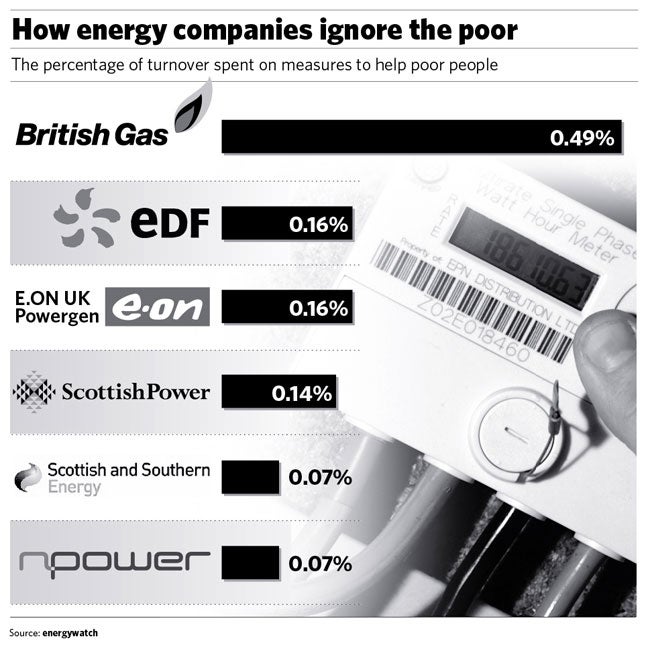Energy suppliers 'are profiteering from poor people'

Your support helps us to tell the story
From reproductive rights to climate change to Big Tech, The Independent is on the ground when the story is developing. Whether it's investigating the financials of Elon Musk's pro-Trump PAC or producing our latest documentary, 'The A Word', which shines a light on the American women fighting for reproductive rights, we know how important it is to parse out the facts from the messaging.
At such a critical moment in US history, we need reporters on the ground. Your donation allows us to keep sending journalists to speak to both sides of the story.
The Independent is trusted by Americans across the entire political spectrum. And unlike many other quality news outlets, we choose not to lock Americans out of our reporting and analysis with paywalls. We believe quality journalism should be available to everyone, paid for by those who can afford it.
Your support makes all the difference.Energy companies have been accused of profiteering by charging vulnerable customers –who receive "discounts" on their bills – more than the wealthiercustomers.
Research commissioned by the watchdog Energywatch shows that none of the "social tariffs" offered by the six big energy companies are cheaper than the best deal on the market.
Overall, electricity companies are estimated to be making £296m in unjustified top-up charges to people on low incomes using pre-payment meters than they do to generally wealthier customers paying by direct debit, according to Energywatch.
It found that the big six – British Gas, Npower, E.ON, Scottish and Southern, Scottish Power and EDF – spend one thousandth of their £24bn annual turnover subsidising bills through social tariffs. Annual payments total £28m.
At the same time, the companies are estimated to be charging customers using pre-payment meters £543m more than direct debit customers. After subtracting the £247m cost of providing the meters, the companies are estimated by Energywatch to be making £296m extra from pre-payment households.
The Chancellor, Alistair Darling, met the regulator Ofgem yesterday following Npower's decision earlier this month to raise prices 15 per cent, pushing up average annual fuel bills to £1,000. Other companies are expected to raise their prices in coming weeks, pushing hundreds of thousands of people into difficulty paying bills.
To check whether companies are offering enough support, Energywatch commissioned the independent experts Cornwall Energy Associates to investigate social tariffs.
The unpublished report says 542,000 people – one in eight of the people in "fuel poverty" – receive discounts of about £122 annually from help schemes with names such as Essentials or Energy Assist. Npower and Scottish Power give the least money, spending respectively 0.04 per cent and 0.1 per cent of their turnover. British Gas is more generous, contributing 1.74 per cent of its turnover.
However, the amount all the companies spend on these schemes pales into insignificance compared to the extra money they raise through higher prices to meter customers that are over and above the costs of providing the meters.
Cornwall Energy Associates also found that the social tariffs were more expensive than the cheapest dual-fuel deals available, and in many cases than the deals offered by the companies themselves. Scotttish Power's was £19 more expensive, Npower's £26 more expensive and British Gas £96 more expensive than their own best deals. Scottish and Southern Energy's was £71 cheaper and EDF Energy £151 cheaper.
"It's good to see the social tariffs from EDF Energy and Scottish and Southern Energy significantly undercut the lowest open prices they have on offer. However none of the other suppliers pass the key test of making social tariffs cheaper than any offering," said Energywatch's Richard Bates.
"Customers on social tariffs must be assured that they are on a company's lowest rate regardless of who their supplier is."
Energywatch called on the Government to require suppliers to offer social tariffs that meet minimum standards. However, there is concern that the Government is failing to tackle fuel poverty. Ministers are cutting funding for the Warm Front programme – which provides insulation and central heating free to people on benefits – by 25 per cent during 2008 to 2010.
The Energy Retail Association responded that suppliers offered winter rebates, price freezes, and free insulation as well as social tariffs. "No other business sector voluntarily provides more help for low income and vulnerable households," it said. "Not all prepayment customers are vulnerable or low income customers," it added.
Join our commenting forum
Join thought-provoking conversations, follow other Independent readers and see their replies
Comments